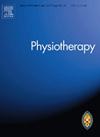Acceptability and feasibility of a novel postural management night-time intervention to improve respiratory health of children and young people with complex neurodisability (Breathe-Easy): proof of concept study
IF 3
3区 医学
Q1 REHABILITATION
引用次数: 0
Abstract
Objectives
Children and young people with complex neurodisability (CYPCN) are at high risk of respiratory illness, frequent hospital admissions and premature death. This study aimed to test the acceptability and feasibility of Breathe-Easy, a novel night-time postural intervention to improve respiratory health in CYPCN.
Design
Case series design incorporating a pre-post interventional study and qualitative study.
Setting
Intervention conducted at home by parents/carers.
Participants
CYPCN aged 2 to 18 years, dependent on others to move, swallowing difficulties, gastrostomy/jejunostomy, and under care of a respiratory paediatrician.
Intervention
Breathe-Easy protocol included CYPCN lying on a flat bed, three-quarters prone or side-lying using existing night-time positioning equipment. A bile-bag was used to minimise reflux. CYPCN trialled intervention for 6 months.
Main outcome measures
Measures of respiratory health and sleep were collected at baseline, three and six months. Semi-structured interviews were conducted with parents, CYPCN, and healthcare professionals post intervention. Data analysis comprised descriptive statistics and thematic analysis.
Results
Eleven CYPCN were recruited; eight completed the trial. We interviewed 5 CYPCN, 9 parents, 8 healthcare professionals, 6 carers and one teaching assistant. Positive views were expressed regarding sleep quality, breathing, secretion management and reduced hospitalisation. Overall improvement in respiratory health and sleep measures. All eight participants planned to continue with Breathe-Easy.
Conclusion
Breathe-Easy appears acceptable and feasible. Further research will need to evaluate feasibility of implementation by other teams and families, and any impact on progressive musculoskeletal deformity, including addressing methodological challenges gathering key outcomes and adverse events.
Contribution of the Paper
- •Aspiration is a common cause of respiratory illness and CYPCN may be at risk of aspiration of saliva or stomach contents if positioned on their backs to sleep.
- •The Breathe-Easy intervention provides a novel night-time position with the potential to improve breathing, sleep, help prevent respiratory illness and improve quality of life.
- •Effects of this new positioning will need to be evaluated with respect to any consequences for progressive musculoskeletal deformity.
- •This study highlighted the feasibility of some outcome measures and need for review in future research.
一种新型体位管理夜间干预改善复杂神经残疾儿童和青少年呼吸系统健康(Breathe-Easy)的可接受性和可行性:概念验证研究
患有复杂神经功能障碍(CYPCN)的儿童和青少年是呼吸系统疾病、频繁住院和过早死亡的高危人群。本研究旨在测试Breathe-Easy的可接受性和可行性,这是一种新的夜间姿势干预措施,可改善CYPCN患者的呼吸健康。DesignCase系列设计包括介入前后研究和定性研究。设置由父母/照顾者在家中进行的干预。参与者年龄在2 - 18岁之间,需要依靠他人移动,有吞咽困难,需要做胃造口术/空肠造口术,在儿科呼吸内科医生的护理下。interonbreathe - easy方案包括CYPCN躺在平床上,四分之三俯卧或侧躺,使用现有的夜间定位设备。使用胆囊袋来减少反流。CYPCN试验干预6个月。主要结果测量在基线、3个月和6个月收集呼吸健康和睡眠测量。干预后与家长、CYPCN和医疗保健专业人员进行了半结构化访谈。数据分析包括描述性统计和专题分析。结果6例CYPCN被招募;8人完成了试验。我们采访了5名CYPCN, 9名家长,8名医护人员,6名护理人员和1名助教。在睡眠质量、呼吸、分泌物管理和减少住院方面,都表达了积极的看法。呼吸健康和睡眠措施的全面改善。所有8名参与者都计划继续使用Breathe-Easy。结论易呼吸是可接受的、可行的。进一步的研究将需要评估其他团队和家庭实施的可行性,以及对进行性肌肉骨骼畸形的任何影响,包括解决收集关键结果和不良事件的方法学挑战。•误吸是呼吸系统疾病的常见原因,如果CYPCN仰卧睡觉,可能会有唾液或胃内容物误吸的风险。•轻松呼吸干预提供了一种新的夜间姿势,有可能改善呼吸,睡眠,帮助预防呼吸系统疾病和提高生活质量。•需要评估这种新体位对进行性肌肉骨骼畸形的影响。•本研究强调了一些结果测量的可行性,并需要在未来的研究中进行审查。
本文章由计算机程序翻译,如有差异,请以英文原文为准。
求助全文
约1分钟内获得全文
求助全文
来源期刊

Physiotherapy
医学-康复医学
CiteScore
6.40
自引率
3.00%
发文量
377
审稿时长
82 days
期刊介绍:
Physiotherapy aims to publish original research and facilitate continuing professional development for physiotherapists and other health professions worldwide. Dedicated to the advancement of physiotherapy through publication of research and scholarly work concerned with, but not limited to, its scientific basis and clinical application, education of practitioners, management of services and policy.
We are pleased to receive articles reporting original scientific research, systematic reviews or meta-analyses, theoretical or debate articles, brief reports and technical reports. All papers should demonstrate methodological rigour.
 求助内容:
求助内容: 应助结果提醒方式:
应助结果提醒方式:


